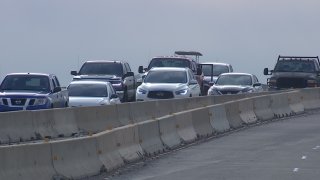
The sound of a car horn is enough to make any driver or pedestrian whip their head around, but a California motorist is sounding the alarm on a thorny Constitutional question.
In the case of Porter v. Martinez, a California woman says that her free speech rights were violated when she was ticketed for using her car horn during a 2017 protest in San Diego County.
According to the National Constitution Center, a judge held that a sheriff’s deputy had the power to cite a woman who honked her car horn at a 2017 rally protesting against former Rep. Darrell Issa.
The woman was cited under a California law that holds that horns in cars should not be used except in instances where “safe operation” requires it, or as a “theft alarm system.”
The woman alleged that her First Amendment rights were violated, and that honking the horn in support of protesters was an expression of her political views.
The U.S. Circuit Court of Appeals rejected that argument earlier this year, concluding that the law was narrowly-designed for ensuring public safety and therefore did not violate the First Amendment.
The case will be part of the Supreme Court’s docket this week, according to Autoblog.
Local
Honking horns have been the subject of multiple court cases in Montana, Washington and Oregon, according to the website. In the first two states, horns were used to show disagreements with neighbors, and courts ruled against the plaintiffs. In the Oregon case, a case was decided in favor of anti-Gulf War protesters who used their car horns to show their disapproval of the invasion of Iraq.
Laws related to horns are on the books in Chicago. According to the text of the law, "the sounding of any horn or signal device….except as a danger signal….or the creation of by means of any such signal device of any unreasonably loud or harsh sound or the sounding of any such device for an unnecessary and unreasonable period of time, is hereby prohibited,” according to American Legal Publishing.
Feeling out of the loop? We'll catch you up on the Chicago news you need to know. Sign up for the weekly Chicago Catch-Up newsletter here.
An Illinois law contains similar language to the Chicago ordinance.



